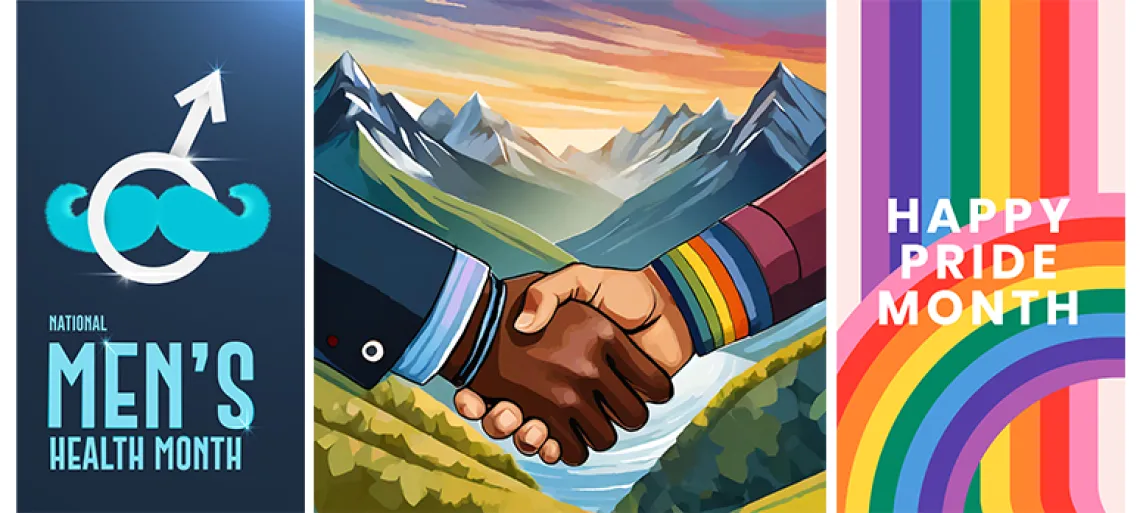
According to the World Health Organization, health is not just the absence of disease. Instead, it is a state of physical, mental, and social well-being.
It's almost a cliché that people who identify as men, particularly cisgender men (like yours truly), tend to ignore certain aspects of their health and wellness. This neglect often leads to negative health outcomes. Therefore, the U.S. Department of Health and Human Services promotes Men’s Health Month each June to encourage boys, men, and their families to implement healthy living practices.
Due to a variety of factors research from the Centers for Disease Control and Prevention shows that those who were assigned male die at a higher rate from heart disease, cancer, diabetes, and suicide than those who were assigned female. (Note that the Department of Health and Human Services and the CDC use a binary gender framework when they collect public health information, and their data does not account for trans and nonbinary experiences.)
June is also Pride month where we celebrate the LGBTQ+ community and advocate equality, equity, and opportunities to live as our true selves. These two months can, and should, go hand in hand because LGBTQ+ men, along with the stats mentioned above, also live with higher rates of depression, tobacco and drug use, suicide, and face discrimination and lack of access to health and medical services.
There is good news, though. You can take steps to help reduce your risk or support those around you for each of these leading causes of death.
Preventive care – Physical health
Cancer, diabetes, and heart disease: These chronic diseases are far too common in the United States today. Healthy practices like exercising regularly, eating a balanced diet, and managing stress can help reduce your likelihood of developing them.
But to truly know how your body's doing, you need to see what is going on inside and out. This means taking the time to schedule a check-up with your primary care physician to discuss your habits, family history, medical history, and more.
If you can't get to the doctor quickly, an alternative starting place in your preventive health journey is a workplace Mini-Health Screening. You can even bring the numbers you get from this appointment to your next doctor's visit and begin your conversation with a solid baseline of information.
And if lowering your likelihood of disease isn't enough incentive, you can even get money from the state for participating in preventive care. Sign up for the Health Impact Program, earn points with wellness activities such as Mini-Health Screenings, and receive up to $200 extra in your paycheck once per year.
Preventive care – Mental health
I don’t know about you, but I was often told growing up that "boys don’t cry," or I should just "man up." As a proud bisexual man, these statements only fueled the fire of toxic masculinity growing up. Although I was better able to fit in with the “traditional” masculine group by conforming with these statements and hiding who I am, it took a toll on my mental health.
Suicide has been a leading cause of death in the U.S for many years. Men die from suicide almost four times more often than those who identify as women. (It has to be said that trans and nonbinary people, especially adolescents, and other members of the LGBTQ+ community are also at high risk of suicide, as research from the University's own Russell Toomey and others has demonstrated.)
Suicide is a complex public health crisis, and addressing it requires a multifaceted approach. Still, data shows that some factors have led to increases in suicidal behavior among people who identify as men, such as that tendency to avoid seeking help.
You don't need to let it get to a critical point before you seek help. As a benefits-eligible University of Arizona staff member, you can reach out for noncrisis employee assistance counseling any time. (And if you or someone you know is struggling, you can contact the Suicide & Crisis Lifeline by calling, texting, or chatting at 988.)
View CredibleMind's collection of mental health resources for the LBGTQA+ community.
Support – Social health
Are you starting to think about your health in new ways, or in ways you haven't for a while? Good. Instead of adding summer projects to your to-do list this month, try to focus on yourself and those in your community and what will help keep you and them going in the long term.
You can also be a major support to those men in your life. It has been shown specifically that men in the LGBTQ+ community who have good social support have higher rates of self-esteem, positive group identity, and positive mental health.
June will end, but that does not mean that you need to forget about your health and well-being. Your health is important; you are important. Take time to invest on your journey toward physical, mental, and social well-being now and in the future.

